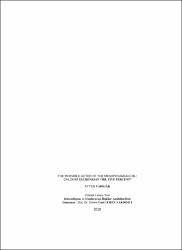| dc.contributor.author | Yadigar, Ayten | |
| dc.date.accessioned | 2019-12-23T07:04:37Z | |
| dc.date.available | 2019-12-23T07:04:37Z | |
| dc.date.issued | 2018 | |
| dc.identifier.uri | https://hdl.handle.net/20.500.11776/3278 | |
| dc.description.abstract | This dissertation reveals the importance of individuals in the political economy of Mesopotamian oil resources in the foundation process of Iraq after the World War I. One of the consequences of the First World War was the emergence of need for the establisment of a new order in the oil rich ex-Ottoman territories after the disintegration of the empire. The industrialized Western states at that time were in need of more and more energy due to inreasing use of energy both in military and civil areas. Since energy became a matter of priority for these countries, the oil-rich Middle East which meant to get access to new resources became an attractive region for them. The territory was also economically attractive and commercially lucrative for the major oil companies of that time. Oil was the common denominator between states and companies and there was a ground for both struggle and collaboration among these actors. In this process which ended with the the foundation of Iraq and the formation of first oil cartel, the role of Caloust Gulbenkian was interesting and noteworthy. This study approaches to the Iraqi oil issue, which has been usually handled at states level, by taking the individual as the unit of analysis. Within the framework of the theory of the international political economy, literature and archive review have been done. The importance of the role of individuals in the foundation process of Iraq has been scrutinized within the framework of descriptive analysis and the chronology generated from the oil related events of that period of time. According to the findings of the study, the efforts of Caloust Gulbenkian who was also known as “Mr. Five Percent”- the nickname pointing to his role in the process and his share in Iraqi oil- had been influential in bringing together the relevant statesmen and executives of oil companies. The long lasting struggle over Middle Eastern oil ended after a series negotiations, conferences and agreements between states and major oil companies of that time. The struggle over the sharing of the Middle Eastern oil had also been effective in the drawing of the boundaries of Iraq within the new system established in the region after the collapse of the Ottoman Empire. This thesis shows that in the foundation process of Iraq the individual level of analysis is important as well as the state level in order to better understand this period. | en_US |
| dc.description.abstract | Bu tez Birinci Dünya Savaşı’ndan sonra Irak’ın kuruluş sürecinde Mezopotamya petrol kaynaklarının ekonomi politiği açısından bireylerin önemini ortaya koymaktadır. Birinci Dünya Savaşı imparatorluğun dağılmasından sonra eski Osmanlı topraklarında yeni bir düzenin kurulması ihtiyacını ortaya çıkarmıştır. Dönemin endüstrileşmiş Batılı ülkeleri açısından da hem askeri hem sivil alanlarda artan enerji kullanımı nedeniyle daha fazla enerjiye ihtiyaç duyulması söz konusudur. Enerji bu ülkeler için öncelikli bir mesele haline gelmiştir ve petrol zengini Ortadoğu yeni kaynaklara ulaşmak için cazip bir bölge olarak karşımıza çıkmaktadır. Bu topraklar büyük petrol şirketleri için de ekonomik açıdan cazip ve ticari açıdan da kazançlı bir bölge olarak görülmektedir. Petrol, devletler ve şirketler için bir ortak paydadır ve hem işbirliği hem de çatışmaya müsait bir zemin söz konusudur. İlk petrol kartelinin oluşumu ve Irak’ın kuruluşu ile tamamlanan bu süreçte Kalust Gülbenkyan’ın oynadığı rol ilginç ve kayda değerdir. Bu çalışma, genellikle devletler düzeyinde ele alınan Irak petrolleri konusuna analiz birimi olarak bireyi alarak yaklaşmaktadır. Uluslar arası Ekonomi Politik kuramı çerçevesinde literatür ve arşiv taramaları yapılarak, betimleyici analiz ve oluşturulan kronoloji çerçevesinde Irak’ın kuruluş sürecinde bireylerin oynadığı rolün önemi irdelenmiştir. Çalışmanın bulgularına göre, süreçteki rolü ve Irak petrolündeki payına atfen “Bay Yüzde Beş” olarak da bilinen Kalust Gülbenkyan’ın çabaları, ilgili devlet adamlarını ve şirket yöneticilerini bir araya getirmekte etkili olmuştur. Uzun yıllar süren Ortadoğu petrolleri üzerindeki mücadele, devletler ve petrol şirketlerinin dâhil olduğu bir dizi görüşmeler, konferanslar ve imzalanan anlaşmalar sonunda çözüme kavuşturulmuştur. Ortadoğu petrolleri üzerindeki bu paylaşım mücadelesi, Osmanlı İmparatorluğu’nun çöküşünden sonra bölgede kurulan yeni sistemde Irak’ın sınırlarının çizilmesinde de etkili olmuştur. Bu çalışma, Irak’ın kuruluş sürecinde devlet düzeyinin yanı sıra birey düzeyinde analizin de bu dönemi daha iyi anlamak açısından önemli olduğunu göstermektedir. | en_US |
| dc.language.iso | eng | en_US |
| dc.publisher | Namık Kemal Üniversitesi | en_US |
| dc.rights | info:eu-repo/semantics/openAccess | en_US |
| dc.subject | Gulbenkian | en_US |
| dc.subject | Iraqi Oil | en_US |
| dc.subject | Mr. Five Percent | en_US |
| dc.subject | Political Economy | en_US |
| dc.subject | Bay Yüzde Beş | en_US |
| dc.subject | Ekonomi Politik | en_US |
| dc.subject | Gülbenkyan | en_US |
| dc.subject | Irak petrolleri | en_US |
| dc.title | The invisible actor of the mesopotamian oil: Caloust Gulbenkian “mr. five percent” | en_US |
| dc.type | masterThesis | en_US |
| dc.department | Enstitüler, Sosyal Bilimler Enstitüsü, Küreselleşme ve Uluslararası İlişkiler Ana Bilim Dalı | en_US |
| dc.relation.publicationcategory | Tez | en_US |



















